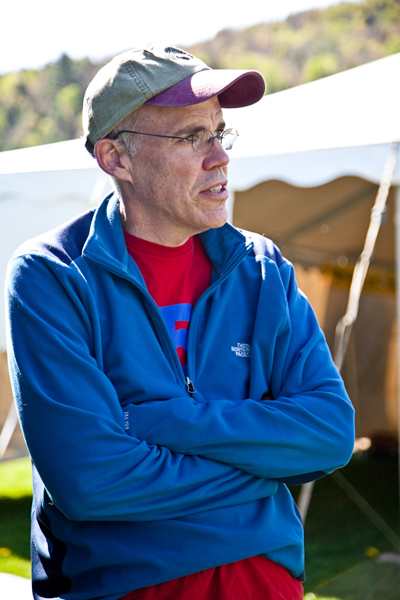

The audience was already applauding and cheering as author and environmentalist, Bill McKibben, walked onto the platform of Lecture Center 100 Tuesday, Sept. 16 to lecture about climate change.
McKibben, author of “The End of Nature” and founder of 350.org, the first international, grassroots environmental movement, addressed his audience with the same soft spoken poise that set climate change advocacy on fire.
“We want people to take care of the world that they were born in,” McKibben said. “And our movement must move quickly and intensely because time is against us.”
According to McKibben’s lecture, the global temperature has risen one degree Celsius which has caused the arctic ice sheets to melt quicker and the ocean to become 30 percent more acidic. The severe change in weather change has led to a 71 percent increase in extreme rain events over the past year. Time is running out and the tides will not wait for humanity to notice.
“Anything we are theoretically committed to, we are destroying,” McKibben said.
He emphasized the significance of recent Siberian forest fires, the California drought, dried river beds and the Keystone pipeline.
McKibben displayed photographs of his work with 350.org and climate crisis efforts from around the world. Photos of 350.org participants in hijabs or t-shirts, globally represented the sphere of influence of McKibben’s work.
“It is beautiful, but we are playing defense,” he said. “We have to play offense, too.”
The attending New Paltz team, a medley of students, faculty, environmental activists and concerned residents, responded favorably as McKibben spoke.
“McKibben made clear that we, as a society, are at the point of no return in terms of repercussions from climate change,” Liberal Arts and Science Dean, Laura Barrett said. “We need to change the way we use and abuse energy as individuals.”
The globe-trotter climate change expert first arrived on the doorsteps of SUNY New Paltz as a gift from alumnus Howard Goldblatt and his wife Leila Goldblatt, according to Despina Williams Parker, staff assistant to the dean of liberal arts and science.
The complicated process of booking McKibben at New Paltz began last year. People from an ad hoc committee of liberal arts and the Campus Sustainability Coordinator, Lisa Mitten, had come together to propose an environmentalist speaker to address global warming. Through connections and time, McKibben accepted the New Paltz invitation.
“It did dovetail nicely with the campus’s celebration of the 50th anniversary of the Wilderness Act,” Parker said.
Promoting more environmentally savvy events, McKibben stressed the significance of the People’s Climate Change March.
Glimpses of white signs stating, “Will you be on the bus?” broke up the sea of earth-colored clothing in the crowd.
This motto has familiarized itself on an international scale over the past few months. Hundreds of environmental activists and organizations had billboards littered across the world advocating for the People’s Climate Change March which occurred in the Upper West Side of New York City on Sept. 21.
There were nearly 400,000 people that walked the streets in what is being considered the “largest environmental movement in human history,” according to the official site. The thousands of protestors were joined by United Nations Secretary General, Ban Ki-moon and of course, Bill McKibben.
McKibben closed with a warning that also functioned as an inspirational idea.
“Our movement depends on young people,” McKibben said. “We can’t promise victory but we can promise some sense of how many people are ready to engage this fight and it has been a beautiful privilege to see it place after place.”
